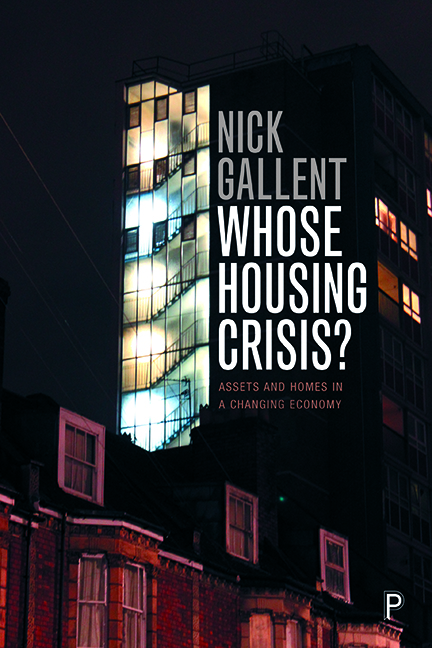6 - An exit strategy
Published online by Cambridge University Press: 27 April 2022
Summary
It is evident to many people that England is in the midst of a sustained housing crisis. The rapid decline in homeownership and spiralling private rents suggest that the crisis, measured in extraordinary affordability ratios between housing costs and stagnating workplace earnings, is deepening. An increasingly large part of the population, including generation rent, is locked out of the market and will remain locked out for the foreseeable future. Even regular incomes derived from good jobs will never catch up with soaring house prices, and those jobs will not allow aspiring homebuyers to accumulate big enough deposits to purchase their own homes. Many politicians have presented this as a crisis of homeownership (and declining ‘asset ownership’ – widening the intergenerational gulf): people are languishing in inferior tenures, especially private renting from amateur landlords, and cannot get a foothold on the housing ladder. Those already on that ladder – baby boomers and buy-to-let investors among them – are thought to be doing well. For them, this is someone else's crisis. They can relax, sit back and watch the value of their property grow, often ‘earning’ more from their homes than from their day jobs. But the backcloth to this is rising inequality, weakening social cohesion and concentrated wealth that does not deliver broader prosperity.
The road to this housing crisis (which I have described as one of cost, affordability and social justice) has been long and tortuous: the failure of successive governments to provide a mix of housing options across the market and social sectors; an overreliance on market production and allocation; bank and finance reregulation stretching back to the 1960s alongside the free flow of credit into the housing sector (supported by the expansion of a secondary mortgage market); tenancy deregulation and the predictable growth of amateur landlordism (alongside the additional investment pressure this generated); the increasing reliance on housing to underpin consumer confidence and drive the post-industrial economy since the Second World War; the looming crisis in state and private pensions; the failure to distinguish between the housing we need and the property we want to invest in, compounded by a failure to regulate that investment (turning housing into the asset class of choice) and now by the inflow of footloose global capital into cities like London.
- Type
- Chapter
- Information
- Whose Housing Crisis?Assets and Homes in a Changing Economy, pp. 131 - 150Publisher: Bristol University PressPrint publication year: 2019



